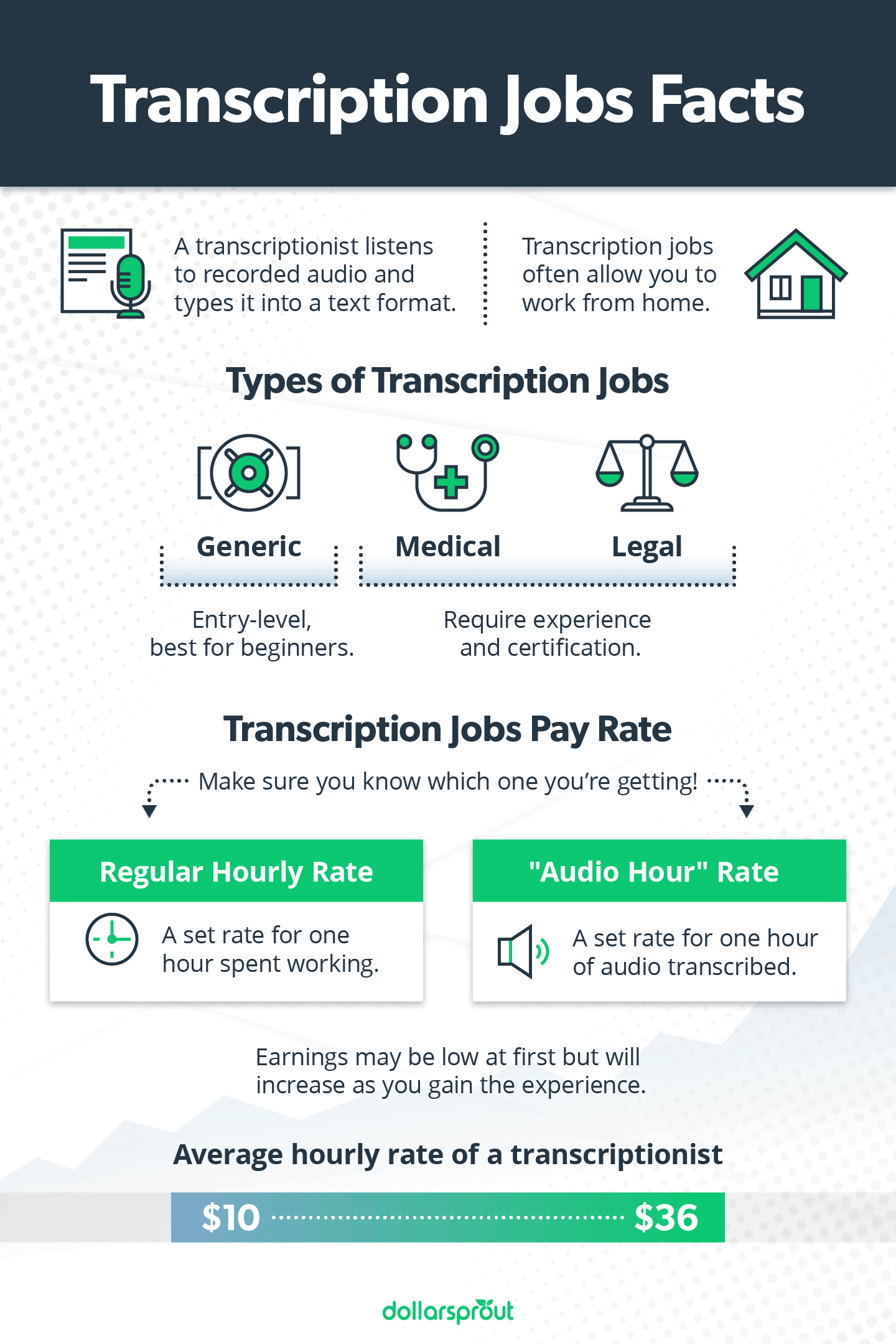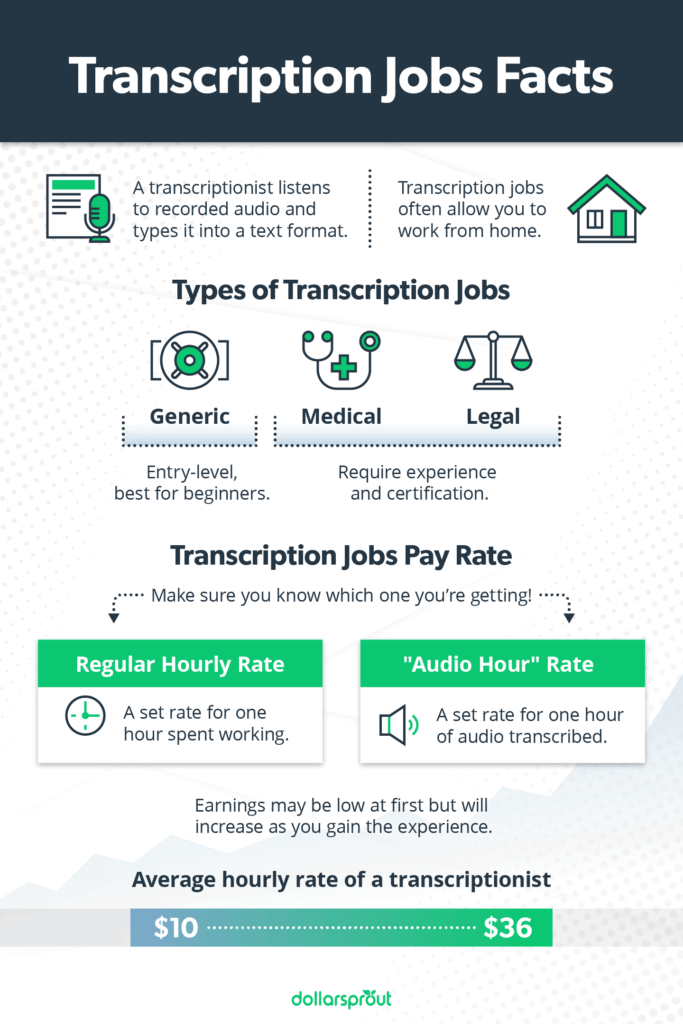In today’s fast-paced digital world, transcription jobs have become a lucrative opportunity for many professionals. Whether it’s transcribing medical records, legal proceedings, or podcasts, the demand for accurate transcription services is skyrocketing. People often overlook how substantial the earning potential can be in this field.
Historically, transcription jobs have been pivotal in various industries, ensuring precise documentation. According to recent data, the global transcription market is projected to reach over $5 billion by 2028. This underscores the immense opportunities awaiting those who seek to explore transcription as a viable income stream.

The Lucrative World of Transcription Jobs
Transcription jobs offer a surprising level of earning potential. They involve listening to audio recordings and converting them into written text. **This skill is in high demand across various industries** such as healthcare, law, and media.
One of the key reasons transcription work is lucrative is its flexibility. You can work from home and set your own hours. **This is perfect for those balancing other commitments or seeking a better work-life balance.**
The pay for transcription jobs can vary significantly. Medical and legal transcriptionists often earn higher rates due to the specialized knowledge required. **Novice transcriptionists can start at a lower rate but can increase their earnings with experience.**
Transcription jobs also offer opportunities for advancement. With improved skills and accuracy, you can take on more complex assignments. **This leads to better pay and greater job satisfaction.**
Industries that Benefit from Transcription
Many industries rely on transcription services to maintain accurate records. In healthcare, transcription helps in creating patient records which is crucial for quality care. **Doctors and nurses often dictate notes that must be transcribed accurately.**
Law firms also depend on transcription. Legal transcriptions are used for court proceedings, depositions, and client meetings. **This ensures that no vital information is missed.**
In media, transcription is essential for creating subtitles and closed captions. This makes content accessible to a wider audience, including those with hearing impairments. **Transcription, therefore, plays a vital role in inclusive media.**
Essential Skills for Transcription Jobs
To succeed in transcription, certain skills are critical. **Strong listening skills help you accurately capture spoken words.**
Typing speed is another important skill. The faster you type, the more work you can complete, increasing your earnings. **Many transcriptionists aim for at least 70 words per minute.**
Attention to detail cannot be overemphasized. You must ensure that every word is transcribed accurately. **This is especially important in fields like medicine and law.**
How to Find Transcription Jobs
There are various platforms where you can find transcription jobs. Websites like Rev, TranscribeMe, and Upwork offer numerous opportunities. **These platforms allow you to choose assignments based on your skill level.**
Joining transcription networks can also be beneficial. These networks offer support and resources to help you improve your skills. **They also provide job leads and industry-specific training.**
Networking with professionals in the field can help you find more job opportunities. Many transcription jobs are found through referrals and word-of-mouth. **Building a strong professional network can be invaluable.**
Skills Required for Successful Transcription
Transcription jobs require a specific set of skills to be successful. These skills ensure accuracy and efficiency in converting audio to text. **Mastering these skills can help you excel in the transcription industry.**
Listening skills are perhaps the most crucial aspect of transcription. You need to accurately capture every word spoken. **This requires concentration and the ability to understand different accents and dialects.**
Another important skill is typing speed. The faster you type, the more work you can complete, which directly impacts your earnings. **A good benchmark is aiming for at least 70 words per minute.**
Attention to detail is equally vital. Accurate transcription involves catching every word, including filler words and background sounds. **This ensures the final text is as close to the original audio as possible.**
Importance of Listening Skills
Effective listening can make or break your transcription career. You must be able to understand various accents, speech patterns, and even technical jargon. Active listening helps capture nuances like tone and emotion.
Many transcriptionists use specialized audio software to enhance their listening skills. This software can slow down speech without distorting it, making it easier to capture words. Training your ears is crucial for complex audio files.
Using noise-canceling headphones can also help. They eliminate background noise, helping you focus better on the spoken words. **This leads to higher accuracy in your transcriptions.**
Importance of Typing Speed
Fast typing speeds allow you to complete more projects in less time. This is especially important for transcriptionists who are paid per project or per hour. **Speed and accuracy go hand in hand for maximum productivity.**
You can improve your typing speed through regular practice. Online typing courses and software can help you reach your speed goals. Consistency is key; even a few minutes of daily practice can lead to significant improvements.
Accuracy should not be sacrificed for speed. Consistently high-quality work will earn you a better reputation. **This, in turn, can lead to higher-paying assignments.**
Importance of Attention to Detail
Attention to detail ensures that your transcripts are error-free. Small mistakes can change the meaning of the text significantly, especially in specialized fields. **Clients rely on precise transcripts for legal and medical records.**
Using transcription software with spell-check and grammar tools can help. These tools catch common errors and suggest corrections. However, always review your work manually to ensure accuracy.
Note punctuation and formatting requirements set by your clients. Different industries may have specific formatting rules that must be followed. **Attention to these details enhances the quality of your transcripts.**
Different Types of Transcription Jobs
There are several types of transcription jobs available, each requiring specific skills and expertise. Medical transcription is one of the most specialized fields. Transcribers often need to understand medical terminology and abbreviations.
Legal transcription is another specialized area. It involves transcribing legal documents, court proceedings, and client meetings. Accuracy is crucial in this field because legal documents are binding and can’t have errors.
General transcription covers a wider range of industries. This can include anything from transcribing business meetings to creating subtitles for videos. These jobs can vary in complexity and pay rates depending on the content.
Real-time transcription, such as closed captioning for live television or events, is also a growing field. This type of transcription requires fast typing speeds and the ability to work under pressure. The demand for real-time transcription services is increasing as more live content is produced.
Leading Online Platforms for Transcription Jobs
Finding the right platform can make all the difference in your transcription career. **Some platforms offer higher pay rates, while others provide more consistent work.** It’s essential to choose the right one based on your needs and skills.
Rev is one of the most popular platforms for transcription jobs. They offer competitive pay and a steady stream of assignments. **Rev also provides a supportive community and resources to help you improve.**
Another well-known platform is TranscribeMe. They are known for their user-friendly interface and flexibility. **TranscribeMe allows you to work on short clips, making it easier to fit transcription into your schedule.**
Upwork is another excellent choice for finding transcription work. Unlike Rev and TranscribeMe, Upwork is a freelance marketplace where you can bid on various projects. **This platform offers a broader range of job opportunities, but competition can be fierce.**
Scribie is another platform worth exploring. They specialize in short audio files and offer a simple way to get started with transcription work. **Their payment structure is transparent, and you can earn bonuses for accuracy and speed.**
Lastly, GoTranscript offers a user-friendly platform with flexible working hours. They provide ample support to beginners, making it easier to break into the transcription field. **GoTranscript’s clear guidelines and helpful community are great for new transcriptionists.**
Tips for Landing and Thriving in Transcription Jobs
Landing and thriving in transcription jobs requires a mix of skills and strategies. First, build a strong resume that highlights your skills, such as typing speed and attention to detail. **Include any relevant experience even if it’s not directly related to transcription.**
Next, practice regularly to improve your transcription skills. Use online transcription tools and typing tests to track your progress. **The more you practice, the more efficient and accurate you’ll become.**
Networking can also play a vital role in finding opportunities. Join online communities and forums where transcriptionists share job leads and tips. **Networking helps you stay updated on industry trends and job openings.**
- Join platforms like LinkedIn and Reddit
- Connect with other transcriptionists
- Share your experiences and ask for advice
Invest in quality equipment to make your job easier. Noise-canceling headphones and a comfortable keyboard can enhance your productivity. **Good equipment minimizes distractions and helps maintain focus.**
Deliver high-quality work consistently to build a good reputation. Clients appreciate accuracy and reliability, which can lead to repeat business and referrals. **Positive reviews and testimonials can significantly boost your profile.**
Frequently Asked Questions
Below are some common questions about making money with transcription jobs. These answers will help you understand the nuances and opportunities in this field.
1. What skills do I need to start a transcription job?
To begin a transcription job, you need strong listening and typing skills. It’s important to be able to type quickly while maintaining accuracy. Attention to detail is crucial for producing high-quality work, and familiarity with transcription software can also be beneficial.
Taking courses or practicing regularly can further enhance these skills. Many platforms require a minimum typing speed, so aim to meet or exceed that benchmark. Practical experience through internships or practice assignments could give you an edge.
2. How much can I earn as a freelance transcriptionist?
Transcription earnings can vary widely based on your experience and the complexity of the work. Entry-level positions might pay less, but specialized fields like medical or legal transcription offer higher rates.
You can expect to earn anywhere from $15 to $60 per audio hour initially. With experience, your earnings can increase, especially if you take on more complex projects or move into specialized fields.
3. Are there any certifications required for transcription jobs?
No formal certification is needed for general transcription jobs; however, specific fields may have requirements. For instance, medical transcriptionists often need certifications from recognized bodies like AHDI (Association for Healthcare Documentation Integrity).
Earning such certifications can improve your credibility and potentially increase your earning potential. They demonstrate proficiency and commitment to maintaining high standards in specialized areas of transcription.
4. Which equipment is essential for starting a career in transcription?
The right equipment significantly impacts your productivity in transcription work. Essential tools include noise-canceling headphones and a reliable computer with good internet connectivity.
A comfortable keyboard will help minimize typing fatigue during lengthy assignments. Additionally, investing in quality transcription software can streamline your workflow and improve accuracy.
5. Can I do transcription jobs part-time?
Yes, many people take up transcription jobs as a part-time endeavor due to their flexible nature. These jobs allow you to set your own hours and choose assignments that fit within your schedule.
This flexibility makes it an excellent option for those balancing other responsibilities like school or another job. It allows you to gradually build your skills and income potential over time without overwhelming commitments.
Final Thoughts
Transcription jobs offer a flexible and lucrative career path for those willing to hone their skills. Multiple online platforms provide ample opportunities to find work, making it accessible for anyone with proficiency in typing and listening.
With the right training and dedication, you can advance from entry-level transcription roles to specialized fields, significantly increasing your earnings. The key is to consistently deliver high-quality work and stay updated with industry trends.

